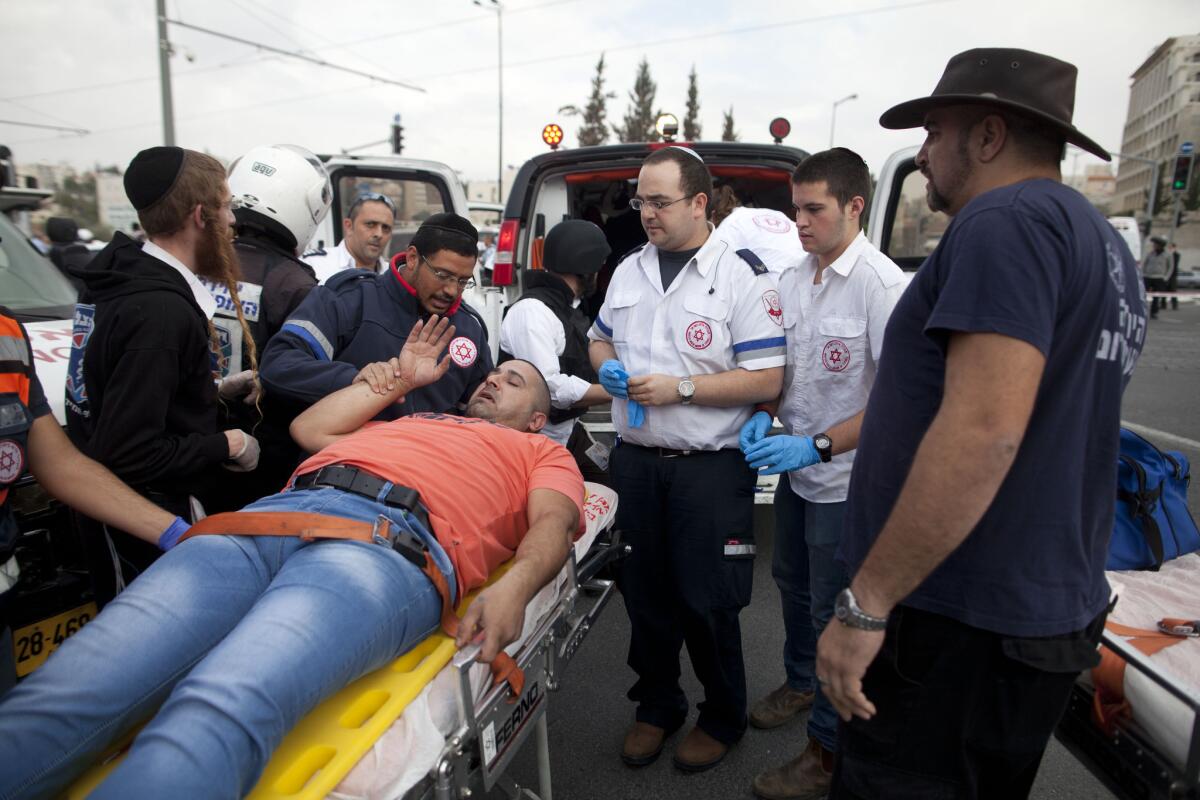Israel deploys more police after Palestinian rams van into crowd

- Share via
Reporting from Jerusalem — In a fresh outbreak of violence in Jerusalem, one person was killed and at least a dozen others were injured Wednesday when a Palestinian man rammed his vehicle into pedestrians at a light-rail stop.
According to witnesses, the driver of a white van struck several police officers and then rammed the vehicle into pedestrians and cars before stalling at a traffic light about 500 yards from the site of the initial strike. He then got out of the van and began attacking passersby with a crowbar before a police officer who had arrived on the scene shot him, the witnesses said.
One victim, identified as border patrol officer Jaddan Assad, a 38-year-old Druze, died shortly after the incident, which was described by authorities as a terror attack. Thirteen people were taken to hospitals throughout Jerusalem with various injuries; several were listed in serious condition.
Shortly after the attack, Israeli media named the slain driver as Ibrahim Akkri, a resident of the sprawling Shuafat refugee camp in northeast Jerusalem. Local reports described him as a supporter of Hamas and said his brother, Mousa Akkri, was deported to Turkey after he was released from an Israeli prison as part of a 2011 prisoner-swap deal for Israeli soldier Gilad Shalit.
The incident was followed by clashes in Palestinian neighborhoods as protesters threw rocks and firebombs and scuffled with police.
In response to the ramming, police instructed that city light-rail stops be lined with concrete barriers.
Wednesday’s incident is the latest in a chain of violent attacks in Jerusalem and similar to a vehicular attack two weeks ago in which a Palestinian driver plowed into a group of Jewish pedestrians and killed a 3-month-old child.
Security and government officials have vowed to crack down on violence fueled by politics and religion and have reinforced local police, adding 1,300 officers in addition to 1,000 others deployed after the incident two weeks ago.
In addition, lawmakers are moving on legislation that would allow harsher jail terms for throwers of rocks and firecrackers, currently the main weapons characterizing what Jerusalem residents describe as a popular intifada, or uprising, despite officials’ reluctance to call it that.
Speaking at the site of Wednesday’s attack, police commissioner Yohanan Danino promised that “we will not allow these incidents to continue.” However, he conceded, “this is a long process. Security is not achieved in one day.”
“The terrorists’ objective is to disrupt our lives. ... We will not let them achieve this,” said Jerusalem Mayor Nir Barkat.
Hamas’ spokesman in the Gaza Strip, Mushir Masri, reportedly welcomed the action and praised the “hands that avenge Al Aqsa,” referring to the Muslim shrine that has been a key flashpoint of recent violence in Jerusalem. Fierce clashes between young Palestinians and police forces took place at the holy site earlier in the day, briefly closing it to visitors.
Echoing recent accusations from Israeli Prime Minister Benjamin Netanyahu that Palestinian Authority President Mahmoud Abbas was encouraging violence in Jerusalem, Israeli Economy Minister Naftali Bennett said it was Abbas at the wheel of what he called “the death car.”
“The terrorists are just his messengers,” he told reporters.
Speaking Wednesday at a ceremony commemorating Yitzhak Rabin, the Israeli prime minister who was assassinated by a Jewish extremist in 1995, Netanyahu said Israel was engaged in a battle over Jerusalem.
“I have no doubt we will win it,” but it will be long conflict that requires unity, Netanyahu said.
Unrest has persisted in the city in the wake of this past summer’s abduction and killing of three Jewish teenagers in the West Bank, followed by the slaying of a Palestinian teenager in Jerusalem.
Ongoing Palestinian protests have recently been aggravated by rhetoric involving the holy site known to Jews as the Temple Mount and Muslims as Haram al-Sharif, where the Al Aqsa mosque is located, evoking fiery passions on both sides.
Jordan on Wednesday recalled its ambassador from Israel for consultations, citing what its official news service Petra called “unprecedented and escalating Israeli aggressions” at the holy site.
Palestinians have also been protesting Israeli policies in Jerusalem, including the announcement of construction plans in contested areas that the Palestinians claim for their future state, and Jewish families moving into Palestinian neighborhoods.
In a media interview Wednesday, Justice Minister Tzipi Livni urged prudence in Israeli measures in the sensitive city. “Just as riots must be handled with force, Israeli decisions must be taken with brains,” she said.
Sobelman is a special correspondent.
More to Read
Sign up for Essential California
The most important California stories and recommendations in your inbox every morning.
You may occasionally receive promotional content from the Los Angeles Times.













